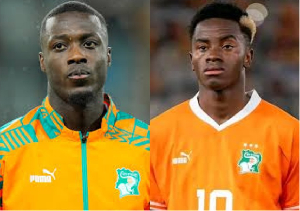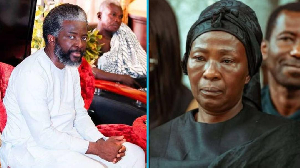(Part 1)
Nana Akwasi Twumasi
Note: The long-awaited final installment of a tripartite series on the subject of tribalism is here at last, after postponing it several times over the past year. To date this may be the most difficult subject matter—and perhaps the heaviest— ever addressed by me. Written in prosaic, poetic, griotic and in-your-face type of language, this article is divided into two parts to make for easy read. Readers are advised to read and digest the contents of both parts to fully unearth the authorial intent contained herein. (The terms Ewes and Ashantis, as used here, have general connotation and don’t necessarily refer to everyone in the Ewe and Ashanti tribes). Enjoy.
Could the eagle-eyed philosopher, the fastidious sociobiologist, the encyclopedic griot, the diurnal witch, and the wordsmith novelist ever successfully explain the shocking diminutive morphology of ants by way of the morphological colossality of elephants? Could the two-month old male baby sire the father by the mother? Why, then, I ask, should Ashantis make these impossible demands on Ewes, and Ewes on Ashantis? Why is the ethnic tension between Ewes and Ashantis so red-hot, so seismic? Is there not a capsuled truism that says every socio-cultural group in Ghana possesses its own jocose ethnic idiosyncrasies? If this is even remotely true, what then is all the fuss about? Could human existence have possibly fared better had biological life totally remained undifferentiated?
If we all had the jealously-guarded IQ of US ex-President George H.W. Bush, President Barrack Hussein Obama’s immediate predecessor, which amongst us could qualify as the next Cheikh Anta Diop or Albert Einstein? If all men stood as tall as the Twa, derogatively termed Pigmies otherwise, of Central Africa, which amongst us could outperform Michael Jordan, outrun Usain Bolt, or outbox Mohammed Ali? If all men took after the unmistakably blinding handsomeness of the infamous Idi Amin, which amongst us could win “The World’s Sexiest Male” trophy? If all women had been black, which amongst these black women would’ve attracted Tiger Wood’s unpredictable affection? You tell me, why don’t honey and sugar always taste better than salt? Don’t we appreciate how the factuality of diversity and difference enrich human existence and make life worth living, brothers and sisters?
Why formulate a thesis in support of biological and ethnic heterogeneity? The point, of course, of the preceding statement is to violently overthrow the wrongheaded notion generally held by Ashantis that the whole country owes her independent national existence to their solo effort, in successfully wrenching Ghana from the tight strangulating clutch which British colonialism Brobdingnagian hands had wrapped around her hyoidal neck. In my opinion, moreover, the repudiation of this false sense of exclusive entitlement has long been overdue. Unfortunate! For this reason and several others we are witnessing today troubling manifestations of cultural pomposity on the part of Ashantis in motley behavioral aberrations, including inferiorizing non-Ashanti Ghanaian cultures. Sad!
For instance, Rebecca Antwi, an Ashanti, introduced her fiancé, Torkonoo, an Ewe, to her uncle, Mr. Sampah, in the Bronx, USA, who subsequently granted them audience during which they discussed Ghana’s national and ethnic politics, the bad state of America’s economy, etc. During the three-member palaver, however, Torkonoo, the self-described scholiast of global politics, displayed a superior grasp of global affairs than his prospective in-law could ever have imagined commanding. Torkonoo, a hardy personality, a studious and industrious character, an attractive young man with magnetic personality and infectious laughter, has acquired in seven years, unaided, a bachelor’s in history and a master’s in political science, both at New School University, NY, received the shock of his life when his prospective in-law’s extended right hand unprovokedly recoiled in sharp response to Rebecca’s announcement Torkonoo was an Ewe.
The soft-spoken Torkonoo, who had also extended his right hand in respectful reciprocation for filial solidarity, automatically withdrew it like an edgy snail recoils into its shell once brought before the sword of Damocles. The forced superior airs hanging over the in-law was just as repugnant. ”Rebecca, why do you choose to walk straight into the exposed fangs of a deadly snake when all the blind about you have walked briskly away… again, why do you choose to suck in carbon monoxide when your whole body is baptized in a sea of unadulterated oxygen?” He demands further of his niece, “How on earth would you date an Ewe?” he halloos. “The Ewes,” he continues, “are a topology of polytheistic, dirty, wickedly fiendish, people,” before exploding in a verbal holocaust, declaring, “They’re culturally imperialistic towards the Ashantis, uncontrollably tribalistic, politically unprogressive, and culturally uncosmopolitan.”
In no time, uncle Sampah slumped into his lazy sofa. With his rapidly pulsating Adam’s apple and beads of sweat all struggling for the limited space on his puny face, uncle Sampah, who has happily found a sedentary domicile in the US for nearly two decades, forces gulps of fizzing Heineken down his naked throat, adding, unabashedly, “And, oh, they, the Ewes, are our local version of Latino racists.” Astonishingly, though, he would mouth off this uncensored comment in the presence of his Venezuelan wife, Mrs. Wilma Rodriquez-Sampah. Why is each group suspicious of the other?
I should add, however, that, ethnicity, in and of itself, is an innocuous concept. But it does become socio-politically problematic only if and when it transcends the threshold of tolerability and respectability and worms its way into fathomless pits of militant ethnocentrism. The other concern is when we allow these speculatively pedestrian ethnic idiosyncrasies to osmotically seep into the matrix of social associations with lifelong dimensions, say, then, the social organism called Ghana gets entangled in unnecessary quagmires of developmental deceleration. Isn’t it equally true that just as biology informs us the cell constitute the fundamental unit of organismic architecture, so too anthropology and sociology hold the view ethnicity makes up the fundamental social unit of the body politic? Isn’t there an easily identifiable positive linear correlation between ethnic disquiet and national incoherency?Rwanda, Sudan, Liberia, the Congo, Ivory Coast, Kenya, Nigeria, providing some of the best examples?
Doesn’t ethnic tension partly, if not wholly, account for some of the discomfortable manifestations of indentations in the Ghanaian national character of politics? Has any one bothered to explore the “Bossard’s Law,” also called the “Residential Propinquity Theory,” and its long-view positive implications for intraethnic relational magnetism and understanding, for peaceful national agglutination, and for effective political centralization? What justifiable reason, if any, motivates my many Ashanti friends to claim with audacious righteousness that the Ewes had always been the single most important retrogressive ethnic cog in the wheel of national development?
Suppose I ask the question: Was Mr. Sampah envious of the young man’s sterling achievements? One may say “possibly.” But the rejoinder, rather shockingly, is No! Why? Because Rebecca would later reveal to Torkonoo that ex-President Rawlings had unjustifiably refused to grant a cabinet portfolio to her grandfather, and, accordingly, her entire family has decided to throw an unfurled blanket of hatred over all Ewes. Oops! Hate all Ewes? For what? Because one bruised, worm-infested apple is enough to spoil the remaining good? Couldn’t this bruised apple by the law of nature be equally regenerative and overly productive, brothers and sisters?
Why the hullabaloo about ethnicity? And, of course, what of the analytic contention that a white person and a black person bathed in utter darkness couldn’t possibly be told apart? Wouldn’t it be even more impossibly and frustratingly so to make out the Ewe and the Ashanti, both of whom, at least theoretically, look alike, when they are thrown together into a pool of veriest darkness?
Well, this is not so controversial a proposition to advance, true, yet, oh my living soul, my philosophically sophisticated Ashanti friend, Yaw Barimah, says the discernment is somewhat possible without the benefit of rocket science. “You will smell Akpeteshie and Keta School Boys if an Ewe is present,” he pontificates with the innocent smile of a respected toothless village scholar. “Under the post-mortem pathologist’s sunny glare, also, the cadaverous Ewe turns fleetingly snow-white albino, the cadaverous Ashanti, on the contrary, retains its original pigmentation,” he quickly adds, then poses rhetorically, “Not strange enough, eh?”
He intimates further, “Yes, I don’t, to tell the truth, take umbrage at Ashantis who make such derogatory remarks about Ewes.” He continues in a similar vein, “In fact, they deserve them,” and then adds, quite cautiously, “The Ewes are a ruthless bunch of exclusivist, unlettered, culturally crude, politically opportunistic, provincial, politically murderous, people.” He intones, “Political kleptomaniacs, political paramours of the West with hidden Machiavellian pretensions, the Ewes, as a group, yea, have a burning desire to metastasize in the body politic and take it over, no way.”
Moreover, Yaw Barimah, the ever talkative, still maintains his intellectual rigidity no matter what, for he says, “What's more, an elatedly unwashed Ewe gives off the stench of a disturbed hyena,” and, “Plus,” he concludes on a final note, “Remove the Ashantis from the body politic and what remains: a headless polity?with no eyes to provide progressive vision for the nation and no head to drive the engine of economic progress. But guess what? The Ashantis constitute the only fountainhead of the nation within whose rigid circumscription is crammed covetous endowments of political leadership; the Ewes, on the other hand, are a mere collectivity of political introns, whose politico-historical activities have had no positive impact whatsoever on the DNA of the national march towards the realization of economic nirvana for Ghana.”
“But daddy,” Asantewaa, Barimah’s beautiful, sour-tongued, widely read 21-year old daughter, uninvitedly jumps in, “Doesn’t your acidic comment about the Ewes echo a similar statement made by Thomas Jefferson, a white man, the 3rd President of the US, about the stinking bodies of enslaved Africans?” She asks, finally, rhetorically, “Who wouldn’t smell hyena unwashed? Is this Jeffersonian verbal cannibalism of one group by another ever a legacy of colonialism or of our own invention? Or both? Which?”
“The Ewe,” a Kumasi-based Akpeteshie distiller, Kwame Kyeremateng, admits, “I believe, simply, possesses a frigid personality, as far as social and political contexts with the Ashantis are concerned.”
“This is not Nigeria,” blurted out the occasional horoscopist Mohammed Nii Kpakpo Komi, the heir apparent to the La throne, the famous Imam cum magician, “where the Hausa, like the Ewe, thinks God sits stubbornly in his head and directs the steering wheel of rulership over the entire country, consigns the Yoruba to intellectualism, the Ibo to mercantilism, the rest to political peonage, in Ghana, our beloved, rulership, however, shall continue to remain a purely collective enterprise.”
“The theory of Afrocentricity,” exhorts Dr. Esi Kuntaku, a professor of social science, “should be the fecund nipple by whose stomata the mother of Ghana’s educational institutions releases her milk of wisdom onto the beating hearts and wisdom teeth of her studious offsprings.”
“Who says the sea doesn’t drink water?” asks Asantewaa. “If the world’s greatest oceans believe themselves pregnant with most of the universe’s water, why could they still, when thirsty, count on the infinite largesse of the sky’s teary rains?” Asantewaa ruminates. “The kaleidoscope of ethnicity, I believe, need be glorified, need be celebrated, not denigrated,” she warns, continuing, “The anatomy of the body politic should be such that it recognizes the physiological contributions of every distinct group in the nation towards the concrete materialization of political homeostasis and of socio-economic progress for the social organism, Ghana,” suggesting, “The ethnic mosaic of nationhood circumscribes the Ewes, the Dagombas, the Gas, the Frafas, the Akans, the Nzemas, the Krobo, and every other unmentioned group here. Together, we constitute the totality of the strength of a broom as a function of its quantized, fractionalized strengths squeezed from its many twiggy or bristly individualized parts,” and concludes, with clear-headed forthrightness, “‘The overall sum of the composite whole,’ they say, ‘is stronger and more important than the additive totalization of its individual parts.”
“How many political murders did Jerry John Rawlings commit?” Kyeremateng throws at Sananu Agbenyenu, another Ewe, his longtime classmate. “Oh,” Sananu replies almost in a carelessly windy whisper, “that is simple, only the Ashantis in his government machinated and actuated the gruesome political murders; I’m afraid Rawlings is being unfairly embroiled in a Trokosi-like penance.”
What happened next defies Newtonian mechanistic logic. This phenomenon is not new to the initiated, however. Sananu, haunted by Kyeremateng’s taboo yet bold query, blurts out a trite homily, preaching-to-the-choir sort of, “Truth be told,” he begins the day’s lazy sermon, “he-- Rawlings, that is-- has been as innocent as Satan, the falsely accused Lucifer, now the devil, the celestially primordial angelic sultry crooner.” He pauses for effect, and then continues, lashing out, “For millennia Rawlings has poured out buckets of soulful tunes of national redemption onto the longsuffering ears of Ghanaians, young and old, male and female, Jew and gentile, the rich and poor, heaven and earth, yet Ghanaians continue to remain ungrateful.” Sananu stops abruptly, takes a soberly sly peep at his soul, a benign sparkle in the thick of a corrupt forest, on a psychically ingrained imaginary mirror, and offers a thoughtfully perceptive peroration, asking, almost sarcastically, in a near-mournful tone, “Why do we reject Junior Jesus, the patriarchal prophet, in his own home, the man who once saved us, rescued us, the chicks, from political vultures and returned us gracefully to the defenseless mother hen?” The preceding, of course, is utterly nonsense to those who don’t take delight in worshipping certified murderers and thieves.
It notes bearing that Ex-Presidents Rawlings and Kufour as well as their respective political parties have equally contributed to the entrenchment of tribalism in our country. Kufour limited the presence of Ewes in his administration, and Rawlings’ and the NDC’s policies favor most Ewes. Most Ewes will defend Rawlings and his NDC party and at the same time lash out at those who blur the line between the man they call “Junior Jesus” and the Ewe tribe.
Many have tried to indelibly etch into our brain the apothegm: “Rawlings is not Ewes.” As if that was not enough, many others have been crucified on the altar of the said apothegm. Brothers and sisters, are the authors and contributors to whom this charge is directed so dumb to differentiate Rawlings, an individual, from Ewe, a tribe? No intelligent beings—at least those to whom this uninformed statement is directed—make a delight of insulting Ewes because they are upset with Rawlings. Mostly the truth that underlines such “behavior” is grossly overlooked in favor of tacitly defending Ewes who make it their business to excoriate anyone who says anything against Rawlings.
I may not condone certain statements made in the past by Mr. Justice Sarpong, Dr. Akadu Mensema, and myself, among others, but I can perfectly understand why those statements were made in the first place. Dr. Akadu is often bathed in a slew of expletive-riddled labels that can’t be reproduced here. And what’s her crime? She writes about Rawlings’ hypocrisy and crimes against Mother Ghana. Again, why would Mr. Sarpong’s neck be placed on the proverbial chopping block whenever he wrote about Rawlings? If Ewes have made it their business to harass Akan authors and commentators and thereby create the impression that an attack on Rawlings is a direct attack on their tribe, do we see why some statements made by those at the receiving end of those insults may be justified, brothers and sisters?
Ashantis and Ewes: Building A Bridge Over Troubled Waters (Part 2)
Rawlings isn’t a fan of mine and this article won’t change that, for the simple fact his brand of hypocrisy is petulant and palpable, to say the least: If ex-President Kufour had orchestrated the murder of a thousand people when he was in office, we couldn’t deny the fact that he isn’t traversing the four corners of Ghana accusing people of murder; if ex-President Kufour had stolen a billion dollars from the national coffers when he was a president, we couldn’t deny the fact that he isn’t accusing any politician of corruption; if there had been questionable roles of ex-President Kufour’s father in his life—and perhaps that his mother was a prostitute, at least we couldn’t deny the fact that he isn’t walking around calling people “bastard”; if ex-President Kufour had credited himself with our democracy under the Fourth Republic per the1992 Constitution, at least we couldn’t deny the fact that he isn’t inciting violence in the country and hiding behind others to jail Ghanaian citizens for expressing their views about him; if ex-President Kufour had slapped his Vice President for voicing his opinion, at least we couldn’t deny the fact that he isn’t foaming at the mouth because some of his opinions aren’t welcomed by President Mills. What do we aim to accomplish by glorifying one corrupt leader and demonizing another because of his tribe?
Ex-President Kufour isn’t guiltless of corruption and he has enough intact brain cells not to accuse others of such. Rawlings, on the other hand, will accuse others of crimes for which he is guilty. And, yes, one doesn’t have to be free of corruption or free of crime to accuse others. However, we shouldn’t entertain the likes of Rawlings for spreading their holier-than-thou nonsense. Rawlings doesn’t answer to anyone but yet expects every Ghanaian to answer to him. What’s more, some Ewes will delightfully accuse ex-President Kufour of corruption but the subject of Rawlings’ unsurpassed corruption and brutality remains either a taboo or is passionately defended—a paradoxical orgy of psychiatric anomaly that would have left Sigmund Freud scratching his head. Considering the oceans of blood and tears that our forefathers shed to wrench Mother Ghana from the hands of our colonial powers, are we charged with the responsibility of protecting Mother Ghana or the “greedy bastards” who give her a bad name?
Why are Ewes so insecure and always suspicious of Akans—Ashantis, in particular? Why do Ewes feel they have to denigrate the rich ancestral history of Ashantis? Why do Ewes blame Ashantis for tribalism but exclude themselves from the equation? Why do Ewes assert the NPP favors Ashantis but will pass through the bowels of hell to prove that the NDC doesn’t do likewise for them? Why do some Ewe writers demand “empirical proof” of the oft-alleged NDC favoritism towards Ewes, of the fact that the Volta Region practices voodooism, while at the same time label the Ashanti Region the most witchcraft-infested region? And, oh, yes, the “empirical proof” that the Ashanti Region has more witches and wizards than any region? Ask the Pentecostals! Why would Ewes criticize an Akan for being a “tribalist” and yet question the sincerity of that Akan eulogizing a fellow Ghanaian who happens to be an Ewe? Why would an Ewe accuse Akan authors of making faulty generalizations, while at the same time arguing passionately that he/she did not get a dime under the erstwhile NDC regime—as if to suggest that the fact that he/she did not enjoy any preferential treatment means other Ewes did not. And why do Ewes feel anyone who hates Rawlings hates their tribe? Is this a bad case of cerebral degeneracy or we’ve simply allowed tribalism to take hold of our emotions?
Again, why do Ewes assume anyone who dislikes Rawlings must be an Ashanti? I am a mixed breed—of a Fanti mother and an Ashanti father—which technically makes me a Fanti, by way of the Akan system of inheritance, even though I don’t mind calling myself an Ashanti. I am a Fanti but I would save Judas Iscariot and send Rawlings to hell, if I were to pick between the two. After all, wasn’t Judas remorseful for betraying the Christ? Didn’t Judas relinquish the amount he was paid to betray the Christ? What has Rawlings done besides accusing others of crimes for which he is known? Brothers and sisters, one doesn’t have to be an Ashanti to speak out against Rawlings’ brutality, history of corruption and his holier-than-thou nonsense.
I dare say rather than permit the unsavory aroma from internecine intraethnic traction to soar higher above Ghana’s ethnic “Tower of Babel,” why don’t we rise above ethnic pettiness and, instead, try to keep abreast with the advancing scientific techniques of the West, to address our many social problems, for instance? It comes as a great surprise to me that even the fungi mycorrhizae and plants coexist hormonally en rapport in a mutually beneficial plexus of nutrient-sharing. Is there a better exemplar of positive relational mutuality for both Ewes and Ashantis to simulate than this?
The problem of ethnic tensions isn’t unique to Africa. It actually began, in fact, in the Christian heaven: Ask Satan and the other fallen angels. It is only a new phenomenon on earth. Every country has its fair share of ethnic problems: the Basque of Spain and of France, the Protestants and the Catholics of Northern Ireland, the Serbs and Croatians of former Yugoslavia, the Hutu and the Tutsi of Rwanda, the Christians and the Moslems of Nigeria, the inhabitants of Darfur and the Moslems of Sudan, the Jews and Gypsies (now Roma) of Germany, Native Americans and African Americans of the US, the ethnic Chinese of Malaysia, the Armenians and Kurds of Turkey, etc. Nonetheless, the US, the Chinese, the Indians, the Japanese, the French, the Malaysians, the British, the Germans, for instance, have not allowed ethnic encumbrances to hijack industrial and scientific developments? Why us?
The West, actually, has already developed the technology to transport commercial passengers to outer space; the Japanese have tossed up a robot into space for Martian reconnaissance and for later colonization; the Chinese have experimentally orbed the planet earth with their newly-built spacecraft in anticipatory preparation for spatial colonization; and plans for spatial exploration by Indians are already in the pipeline. When are our noble and venerable scientists ever going to perfect the fufu-kneading machine, so that human axillary perspiration no longer finds itself in the final product by the traditional pestle-mortar method? When are our scientists ever going to discover lasting cures for sickle-cell anemia, malaria, AIDS? And, possibly, hunger?
So? What is all the ethnic fuss about? Why are humans so unique in our uniqueness? Why can’t we find unitary harmony and hopefulness in our diversity? Consider the anatomic-physiological perfectibility of man: the Eye hates to see the vomit the Mouth gives out; the Mouth stubbornly refuses to ingest the solid product the Anus produces; the Nose detests with passion the flatulence the Anus sometimes gives off; the Neck is forced to carry the Head with its heavy load-- the control panel, otherwise called the Brain; the Hand decides to deal with Anus’s objectionable products through rubbery and papery intermediaries only; the Torso provides the highway link between the Legs and the Neck; the Legs carry the Body’s total weight without complaint; the Hair minimizes the sun’s fiery fury to the Scalp; the Ears sometimes can’t sleep well because the Mouth’s horrible tunes prevent good sleep; the Penis occasionally self-complains about the tendency of its urine to acidify its life-giving force, the Sperm, killing it on the spot, and so on and so forth. Yet for millennia all these disparate anatomies have agreed to work synergistically together. Somehow humans can’t seem to follow the same pattern of successful undertaking. Something wrong?
Where are the Ewes and the Ashantis? Are they taking useful cues from such a mind-boggling and phenomenally perfectly collaborative anatomic-physiologic enterprise, despite the obvious anatomic-physiologic incongruities?
Couldn’t prescience have provided the radical John Lennon the moral reason to pen “Imagine”; Bob Marley to scream “One Love,” “Africa Unite,” or “Zimbabwe”; Lucky Dube to shout “One People, Different Colors”; Cheikh Anta Diop to pour an ocean of blue ink on the pages of The Cultural Identity of Black Africa; Ben Kiernan to drench the pages of Blood and Soil: A World History of Genocide and Extermination from Sparta to Darfur in a sea of red ink; and Molefi Kete Asante to hum a soulful tune with refrain Afrocentricity: The Theory for Social Change?
Here in Ghana, brothers and sisters, would one ethnic group have the moral foolhardiness to refer to the other as “cockroaches,” as in the sorry case of the Hutu to their Tutsi siblings? No, no, no, no, brothers and sisters, I guess not; for this regretfully innocent reference, among several other complicating factors, contributed to the necessary whit spark that provoked the interethnic conflagration we all witnessed in Rwanda. Unfortunately, the Rwandan genocide is not yet over; its vestiges have currently transmigrated into sectional conflicts in neighboring Congo, Joseph Conrad’s and King Leopold’s apparitions still haunting the place, long after they’ve been dead and gone. So long. These sad events recall the following conversations:
“The Congo is in a mess,” recalls the unabashed defender of the global African community and the leading exponent of the theory of Afrocentricity, Dr. Molefi Kete Asante, after meeting with president Kabila sometime late last year, “These interethnic conflicts’re not necessary and should stop,” he adds. “Africa needs to wake up from her long slumber and point to the world, once again, the torch of leadership,” Dr. Asante reiterates. “Ghana is already moving in the right direction, and politically incorrect words such as tribe must evaporate into nothingness from the national language of Ghanaian politics,” he concludes.
A Nigerian-American, Mr. Segun Joseph, a fine Avis manager in the US and a brilliant student of global politics, says, “African-American political leaders and intellectuals should have the moral courage to look African leaders, Ghana’s included, in the eye and tell them like it’s when they take detours from their civic and moral obligations.”
“Ghana has set a moral standard of electoral fairness for other African nations to emulate,” Milton G. Allimadi, the owner, publisher, and editor of the Black Star News, based in the US, admits. “Now the onus lies with Ghanaians to keep the torch of electoral fairness afire,” he warns.
Imhotep Kwesi Shaka-Kenyatta, an African-American hotelier based in Cape Coast, Ghana, opines, “Ghana must leave behind the cross of her past and forge a progressive nationalization of her various ethnic enclaves into a crucible of social cohesiveness and of political solidarity.” Shaka-Kenyatta also delivers the following exhortation, “The political mind of the nation should refrain from idealizing the collective depoliticalization process involving a gang of hyperactive crabs in a basket, in which one crab frustrates the efforts of the other to climb out first and to report back to the rest news of the outside world beyond the narrow purview of the basket that may be detrimental to the collectivity.”
An ex-convict, Ekow Blackson, now a Ba-ha’ist, declares, “The ownership of Ghana, not unlike the air we unconsciously breathe, the ground we foolishly trample upon, the core DNA molecule that miraculously unites our common humanity in a biofilm of spirituality, is no particular group’s God-sanctioned exclusive monopoly. Is it, actually, lest I forget, not the case that the morsel entering the mouth ultimately ends up becoming the exclusive property of the entire body?”
Could Ewes and Ashantis take a momentary break from their juvenile impasse and assume a cursory glimpse of the delicate beauty of a piano or an organ? What do they see? The white-black color combination of the keys? Then what? Would they dare open their ears too? What do they hear? A soulful melody? Then what? Don’t they, also, realize almost immediately the best harmonious melody always proceeds from a combined tactile hammering of both the white and the black keys, and not from either keys in complete, unbridgeable, bitchy isolation? Who, at all, are the Ewes and the Ashantis? Who are they? Actually?
What do we do then? The answer, partly, lies on the slippery tongue of Joseph Hill of culture: “No more tribal war…tribal war ain’t solve the problems,” he sings.
What happens to the Ewe and the Ashanti soul after death? An inquisitive mind launches an investigation to solve the riddle. On one gloomy Sunday morning, a deeply religious prophet, an Ewe, Godson Agbezoholor, stood with arms akimbo under a canopy tree, looking penetratingly at the thunderous sky lost in the forest of his perceived superior intellectual prowess, absent-mindedly grappling with the simplex ontological problem of the day regarding the eschatological fate of the human soul.
He has thus followed this query for what seems like an infinity, with the diligence of a pauper Jesuit priest in hot pursuit of the Holy Grail; none the less, on this particular Sunday morning, as his perfectly spherically-shaped head failed miserably to turn up satisfactory answers, a serendipitous idea just hit him, in the right side of his brain, to seek answers elsewhere, possibly, within the breathlessly claustrophobic tightness of a confessional box. As a result, Godson, bathed in angelic holiness with an apparently glowing halo burning with intense extravagance about his naked metallic head, stealthily approached the confessional box, fearfully entered it, and carefully posed the first question to the part Ashanti part Ewe cross-eyed, gray-bearded, crippled Roman Catholic priest, Father Kudjoe Abraham: Godson: “Does the Ewe go to heaven when he dies?” Priest: “Nope, he goes to the ground.”
The priest’s simplistic answer shook the ground under Godson, buckling him, and rushing him to the floor on his bulbous rickety knees, in arid humility. In the midst of his psychological and emotional Armageddon he reluctantly came to the hard realization that the Ewe is no favored, specialized clone of the Creator. Therefore, he leaned closely against the confessional box window, almost like a mortar adheres to a brick, and barely whispered into the patient priest’s ears, making sure God and the devil never heard it:
Godson: “Does the Ashanti go to hell when he dies?” Priest: “No, he goes to the ground, like the Ewe, like you, my brother.” Godson: “But this is unfair! How about the termite then?” Priest: “Likewise, my brother, nature’s blind, the termite, the Ewe, the Ashanti are indistinguishable from the matter of which the ground, like humans, is constituted, and good luck to you, Amen.” Godson: “What do we do, Father Abraham? Priest: “Learn to get along. Ever taken notice of how chlorophylloid plants relate to the sun? In the absence of the sun the plant shrivels. In the sun’s presence, however, the plant lightens up. Noticed that? What makes the plant display this attitude of schizophrenic phototropism towards the sun whom it obviously doesn’t like because of the excessive heat the sun creates around it? The secret? The sun is fooled into thinking that she does a fantastic job of providing the heat. So the plant’s chameleonic smile activates the sun to show up where she is most needed in order to do what she does best. Therefore, though the plant internalizes the pain it holds no grudges against the sun. The sun understands this perfectly and refuses to externalize or register her opprobrium of the plant’s otherwise ingratitude. All this so man could eat. Yea, call it relational harmony!”
Yes, truly, justifiably, I’m not in any way baffled by Father Abraham’s moral declarations at all? Are the dinosaurs extinct as our noble scientists keep hammering into our stubborn ears? My big heart can accept this scientific tomfoolery no more? Why? Because the supposedly extinct dinosaurs continue to make their presence thunderously felt in our immortal minds. And, what of man’s relationship to this immortal animal, but a mere sandy speck in the larger unfolding drama of the so-called evolutionary history of dinosaur, of the galaxy, of nature, of man himself? The dinosaur is here alive but man is hopelessly dead. Yet man continues to believe otherwise. Strange? What accounts for this phenomenon? Could man, the Ewe, the Ashanti, shed all trappings of ethnic provincialism to preserve the much-cherished territorial integrity and monolithic national character of our beloved country? Could man ever?
“What is the basis of your argument in favor of the existence of darkness?” asks Jiworshie Afetorgbor, a local shoe mender based in Teshie, “The presence of light,” comes the reply from a 16-year old cripple. “Our dialectical natures are truly complementary, oh sure, yea, but between the red bricks of oppositional rebelliousness between the Ewes and the Ashantis, my brother, is a conveniently sandwiched mortar of mutual affinity of one for the other. Love. This is a really heavy, healthy stuff. Indeed. Unbelievable. Isn’t it?” Jiworshie philosophizes.
“‘In the land of the free, in the land of the brave, in that land called America where the white eye of absolutist fairness stares at blackness with the false white teeth of death and a ghostly smile, in that white land,’ of which my dear father speaks so eloquently about, ‘the census holds no privileged, specialized categories for Ewes and Ashantis,’ and he says also, ‘on the census forms, the Ewes and the Ashantis, like African Americans, are labeled Black/African America, no special treatment, simple!’” The precocious 16-year old cripple sings as he struggles to drag his bulky weight along the skinny sinuous path home.
“Should a White South-African be categorized African-American, Black/African American, on the American census forms, too?” he asks and, strangely, however inexplicably, he, the cripple, the 16-year old man, with a gray beard, a tender heart, quickly melts into a total darkness of childhood bliss. Was gone. Never to be seen again. Forever. The part Ashanti part Ewe Roman Catholic priest. The saintly cripple. So long.
Opinions of Tuesday, 27 April 2010
Columnist: Twumasi, Nana Akwasi














